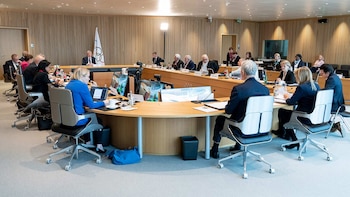
“Athletes cannot be punished for what their governments do.” The statement made by Thomas Bach, president of the International Olympic Committee, after the meeting of the IOC Executive Committee seemed to open the door for athletes from Russia and Belarus to return to competitions, from which they were excluded in February since the invasion of Ukraine.
The IOC remains firm in maintaining sanctions against Russia and Belarus, although Bach said that this exclusion of athletes was not part of the sanction “but rather was a protective measure to safeguard the integrity of the competition and of the athletes themselves”.
“We had to act against our own principles, but the Olympic Movement must be a unifying force and not a dividing force,” Bach said, and in finding a solution so that athletes are not discriminated against “just because of their passport” is the IOC.

After the Executive Committee meeting, the debate continued at the Olympic Summit, where the president of the Russian Olympic Committee, Stanislav Pozdnyakov, was present. The position on sanctions has not changed: Russia and Belarus are still unable to organize competitions in their territories and their flags and anthems will continue apart from international tournaments. The novelty came from Asia.
The Indian Randhir Singh, president of the Olympic Council of Asia (OCA), said that there are no longer reasons that justify these protection measures imposed by the IOC and was open to Russian and Belarusian athletes participating in organized competitions on the Asian continent.
The proposal was received in a positive way and during the debate, the possibility that there would not be a general resolution to the conflict was mentioned, but that each Federation would have to be responsible for evaluating whether in its sport there are still reasons to maintain the protection measures imposed by the IOC.
Faced with this possibility of Russian and Belarusian athletes returning to competition, the United States Olympic and Paralympic Committee (USOPC), which was represented at the Olympic Summit by Susanne Lyons and Gene Sykes (the current president of USOPC and who will replace her in office), emphasized maintaining “strict neutrality”.

“There was absolute agreement on strict neutrality. The sanctions are very specific: without colors and without the name of the country,” Lyons said, saying that there was also talk about athletes who support Russia’s invasion of Ukraine: “That was discussed. I don’t know how they could really know if an athlete supports their government’s actions or not, but at least there was an agreement that they would want to have athletes who haven’t actively supported the conflict.”
The Olympic Summit had an impact on Ukraine. “From the first day of the war, we reacted harshly to any attempt by Russian and Belarusian athletes to represent and promote their countries internationally,” said Vadym Guttsait, Minister of Youth and Sports of Ukraine and president of the National Olympic Committee (CON). And he acknowledged in statements to United News: “We want and we are doing everything possible to ensure that there are no Russians or Belarusians in international competitions while the war in Ukraine continues.”
At the Olympic Summit, they stood in solidarity with Ukrainian athletes and expressed their support so that they can compete with a “strong team” both in Paris 2024 and in Milan-Cortina 2026. The fact is that, while we are discussing what will happen to athletes from Russia and Belarus, the qualifications for the Olympic Games are already underway and their presence remains unknown.
Últimas Noticias
Sinner-Alcaraz, the duel that came to succeed the three phenomenons
Beyond the final result, Roland Garros left the feeling that the Italian and the Spaniard will shape the great duel that came to help us through the duel for the end of the Federer-Nadal-Djokovic era.
Table tennis: Brazil’s Bruna Costa Alexandre will be Olympic and Paralympic in Paris 2024
She is the third in her sport and the seventh athlete to achieve it in the same edition; in Santiago 2023 she was the first athlete with disabilities to compete at the Pan American level and won a medal.

Rugby 7s: the best player of 2023 would only play the medal match in Paris
Argentinian Rodrigo Isgró received a five-game suspension for an indiscipline in the circuit’s decisive clash that would exclude him until the final or the bronze match; the Federation will seek to make the appeal successful.

Rhonex Kipruto, owner of the world record for the 10000 meters on the road, was suspended for six years
The Kenyan received the maximum sanction for irregularities in his biological passport and the Court considered that he was part of a system of “deliberate and sophisticated doping” to improve his performance. He will lose his record and the bronze medal at the Doha World Cup.

Katie Ledecky spoke about doping Chinese swimmers: “It’s difficult to go to Paris knowing that we’re going to compete with some of these athletes”
The American, a seven-time Olympic champion, referred to the case of the 23 positive controls before the Tokyo Games that were announced a few weeks ago and shook the swimming world. “I think our faith in some of the systems is at an all-time low,” he said.




